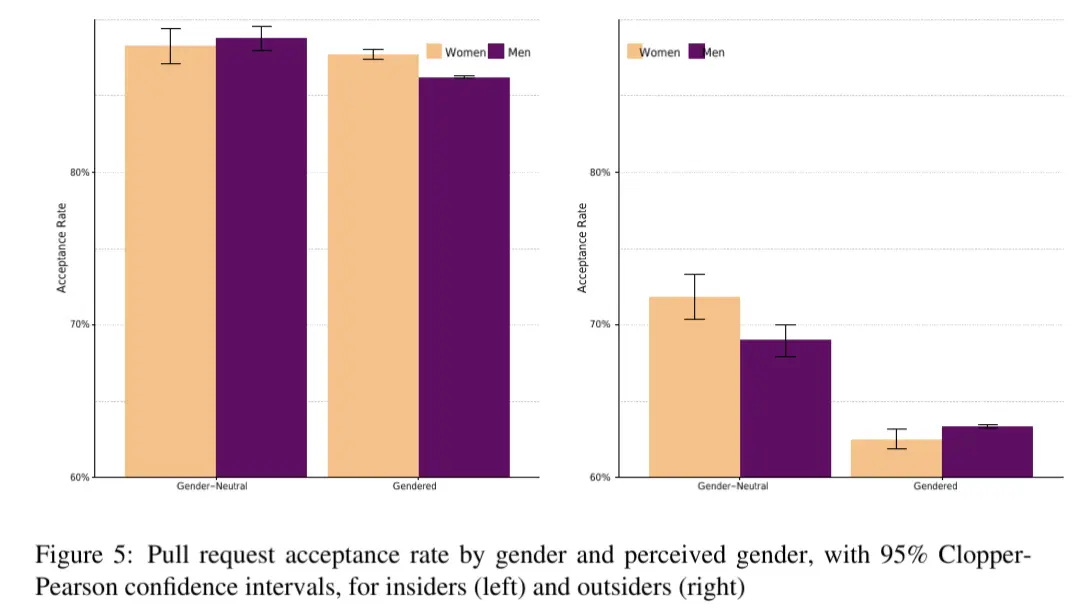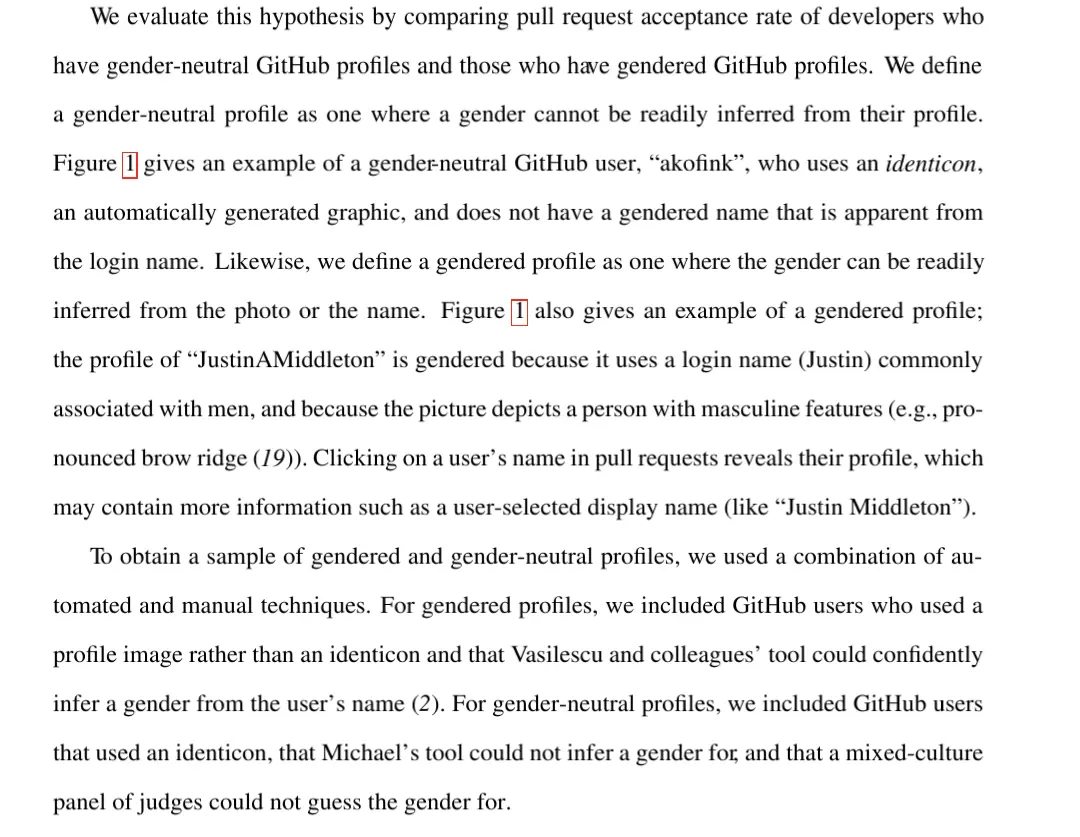Our results show that women’s contributions tend to be accepted more often than men’s [when their gender is hidden]. However, when a woman’s gender is identifiable, they are rejected more often. Our results suggest that although women on GitHub may be more competent overall, bias against them exists nonetheless.
They didn’t use very comprehensive research methods. Also they only used Github.
First, from the GHTorrent data set, we extract the email addresses of GitHub users. Second, for each email address, we use the search engine in the Google+ social network to search for users with that email address. Third, we parse the returned users’ ‘About’ page to scrape their gender.
a bias against men exists, that is, a form of reverse discrimination.
How is it reverse discrimination. It’s still plain old discrimination. I’m starting to smell a biased research here. Or at least the researchers have a bias.
Clearly discrimination is only against woman thus reverse discrimination is against man. /s
any bias that doesn’t confirm my bias is reverse bias
see also: reverse racism
Thanks for pointing it out. There is clearly room for a lot of error.
Anyone found the specific numbers of acceptance rate with in comparison to no knowledge of the gender?
On researchgate I only found the abstract and a chart that doesn’t indicate exactly which numbers are shown.
edit:

Interesting for me is that not only women but also men had significantly lower accepance rates once their gender was disclosed. So either we as humans have a really strange bias here or non binary coders are the only ones trusted.
edit²:

I’m not sure if I like the method of disclosing people’s gender here. Gendered profiles had their full name as their user name and/or a photography as their profile picture that indicates a gender.
So it’s not only a gendered VS. non-gendered but also a anonymous VS. indentified individual comparison.
And apparantly we trust people more if we know more about their skills (insiders rank way higher than outsiders) and less about the person behind (pseudonym VS. name/photography).
…or the research is flawed. Gender identity was gained from social media accounts. So maybe it’s a general bias against social media users (half joking).
I think (unless I misunderstood the paper), they only included people who had a Google+ profile with a gender specified in the study at all (this is from 2016 when Google were still trying to make Google+ a thing).
Thanks for grabbing the chart.
My Stats 101 alarm bells go off whenever I see a graph that does not start with 0 on the Y axis. It makes the differences look bigger than they are.
The ‘outsiders, gendered’ which is the headline stat, shows a 1% difference between women and men. When their gender is unknown there is a 3% difference in the other direction (I’m just eyeballing the graph here as they did not provide their underlying data, lol wtf ). So, overall, the sexism effect seems to be about 4%.
That’s a bit crap but does not blow my hair back. I was expecting more, considering what we know about gender pay gaps, etc.
Perhaps ppl who keep their githubs anonymous simply tend to be more skilled. Older, more senior devs grew up in an era where social medias were anonymous. Younger, more junior devs grew up when social medias expect you to put your real name and face (Instagram, Snapchat, etc.).
More experienced devs are more likely to have their commits accepted than less experienced ones.
We ass-u-me too much based on people’s genders/photographs/ideas/etc., which taints our objectivity when assessing the quality of their code.
For a close example on Lemmy: people refusing to collaborate with “tankie” devs, with no further insight on whether the code is good or not.
There also used to be code licensed “not to be used for right wing purposes”, and similar.
That’s not an excellent example. If they refuse to collaborate with them, and also don’t make any claims about the quality of code, then the claim that their objectivity in reviewing code is tainted doesn’t hold.
Their objectivity is preempted by a subjective evaluation, just like it would be by someone’s appearance or any other perception other than the code itself.
This research isn’t peer reviewed so I wouldn’t take it at face value just yet.
I think the most striking thing is that for outsiders (i.e. non repo members) the acceptance rates for gendered are lower by a large and significant amount compared to non-gendered, regardless of the gender on Google+.
The definition of gendered basically means including the name or photo. In other words, putting your name and/or photo as your GitHub username is significantly correlated with decreased chances of a PR being merged as an outsider.
I suspect this definition of gendered also correlates heavily with other forms of discrimination. For example, name or photo likely also reveals ethnicity or skin colour in many cases. So an alternative hypothesis is that there is racism at play in deciding which PRs people, on average, accept. This would be a significant confounding factor with gender if the gender split of Open Source contributors is different by skin colour or ethnicity (which is plausible if there are different gender roles in different nations, and obviously different percentages of skin colour / ethnicity in different nations).
To really prove this is a gender effect they could do an experiment: assign participants to submit PRs either as a gendered or non-gendered profile, and measure the results. If that is too hard, an alternative for future research might be to at least try harder to compensate for confounding effects.
I wonder if experiences from 12 years ago and numbers from 8 years ago still hold true as of today.
It’s worth trying.
Obligatory mentions of the replication crisis and the Hierarchy of evidence.
Bias against women exists (I remember hearing various “insights” about women IRL from men) but i think something else is going on, reportedly even people who report they are men get “discriminated”, maybe it’s just people who are extroverted show their gender and that slightly correlates with lower quality?
Also i remember reading some woman saying she does not show her gender online to avoid harassment, maybe that also correlates (younger woman not having that insight that not showing your gender could be a net win for the preferences they have)
Here’s the final peer reviewed version https://peerj.com/articles/cs-111/.
Really great comments at https://peerj.com/articles/cs-111/reviews/. The reviewers are very nice about it but do point out some big issues towards the end.
Why would someone know your gender, out your identity?
I mean it’s not exactly uncommon nowadays, there’s tons of commenters on this post that have their pronouns displayed next to their username
I figured it would look more professional, and it would also let me separate the contributions I made with my more anonymous GitHub out—not too sure how closely they investigate your previous contributions and how good your code was.
I am guessing this was not a good choice, and I should have just continued using my more anonymous GitHub, or made the account as JSmith instead of JaneSmith.






